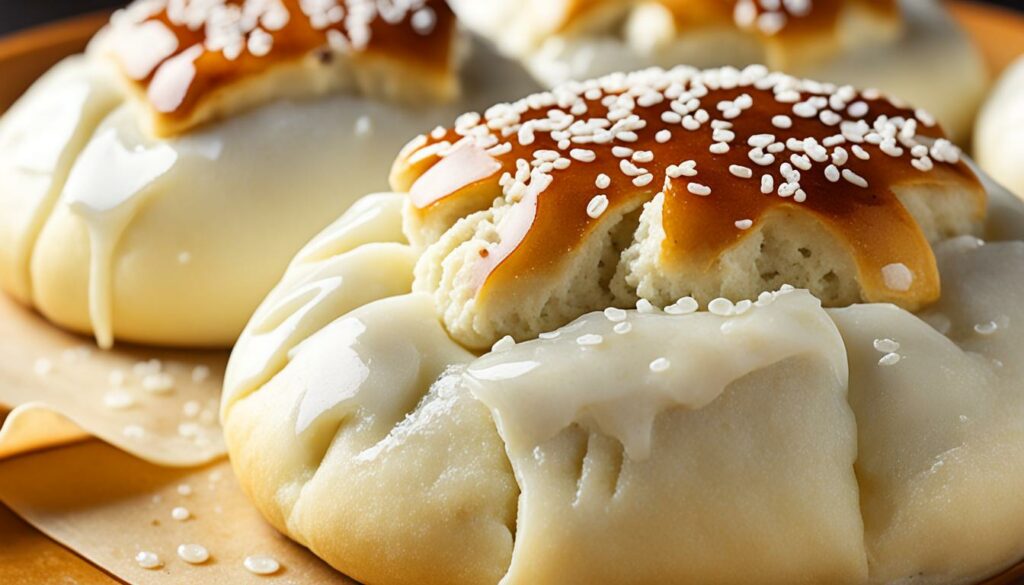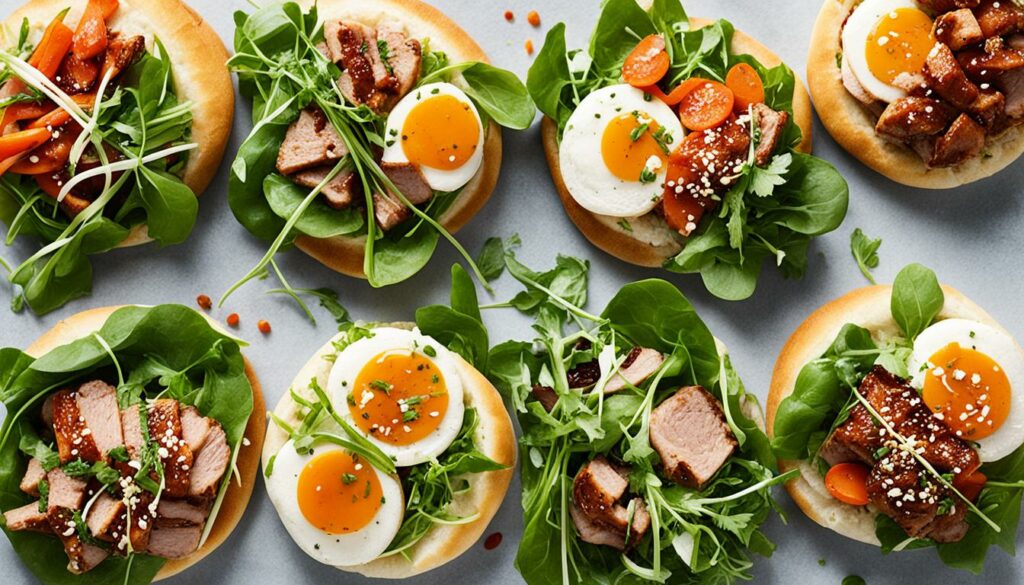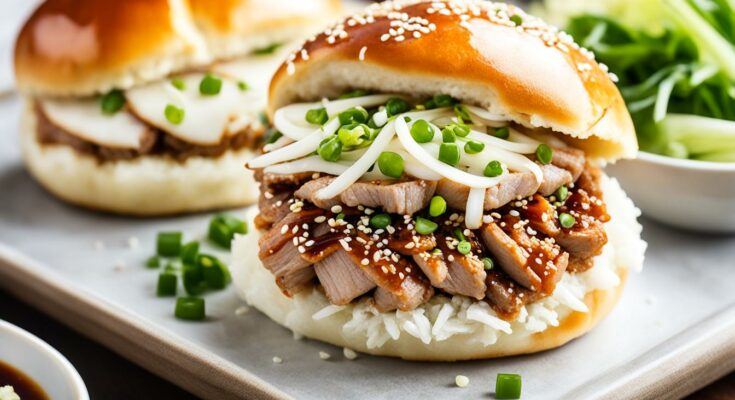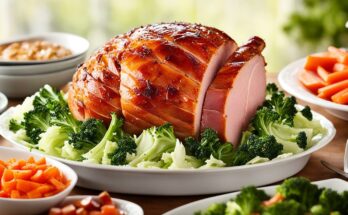Pork buns are a delicious and popular food choice, but have you ever wondered if they are actually healthy? In this article, we will dive into the nutritional aspects of pork buns to provide you with valuable insights. Understanding their nutritional content and health benefits can help you make informed choices when enjoying this tasty treat.
Key Takeaways:
- Pork buns can vary in their nutritional properties based on the type and ingredients used.
- Buns made with whole grains, seeds, and nuts can offer health benefits such as fiber and essential nutrients.
- It’s important to consider portion sizes and be mindful of the calorie and sodium content in pork buns.
- Checking the freshness and storing buns properly can ensure their quality.
- Moderation is key, especially for individuals with allergies or dietary restrictions.
Health Benefits of Buns
Buns, especially those made with whole grains, whole wheat flour, seeds, and nuts, can offer some health benefits. They are a good source of fiber, which helps reduce the risk of gut-related health issues like constipation.
The fiber in buns also acts as a prebiotic, promoting the growth of beneficial bacteria in the gut and supporting immune system function.
Buns made with fortified ingredients, such as iron, niacin, and calcium, can provide essential nutrients that contribute to overall health.
Nutritional Considerations of Pork Buns
When indulging in tasty pork buns, it’s important to be mindful of their nutritional content. Pork buns can be relatively high in calories, with the average floss bun containing around 333 calories. However, the calorie count may vary depending on the specific type of bun and the fillings or toppings added.
Eating pork buns in moderation is crucial to avoid unwanted weight gain. The serving size is an essential factor to consider. By controlling portion sizes, you can enjoy the flavors without compromising your health and fitness goals.
Beyond calories, it’s also worth noting that buns, including pork buns, can be high in sodium. While sodium is a necessary nutrient, excessive intake can be detrimental, especially for individuals with hypertension or high blood pressure. To make informed choices, it’s recommended to check the packaging for nutritional information, including the serving size and sodium content.
Key Nutritional Considerations:
- Pork bun calories: Vary depending on the specific type of bun and fillings or toppings added.
- Pork bun serving size: Controlling portion sizes is essential for maintaining a balanced diet.
- Sodium in buns: Individuals with hypertension should be cautious of sodium content.
Being aware of these nutritional considerations allows you to enjoy pork buns mindfully. By making informed choices and keeping portion sizes in check, you can savor the deliciousness while taking care of your well-being.
Freshness and Storage of Buns
Checking the freshness of buns before purchase is important. It is advisable to verify the expiry date and manufacturing date on the packaging. Buns are best consumed fresh, but they can also be stored for a certain period. Storing them in a container with a tight lid, in a cool and dry place, away from direct sunlight, can help maintain their quality.
In hot weather conditions, storing them in the fridge can prevent pests and ensure freshness. To further extend the shelf life of buns, freezing them is an option. However, it is essential to store them in airtight containers or freezer bags to prevent freezer burn.
When storing buns in the freezer, it is recommended to consume them within two to three months for optimal taste and texture. Thawing frozen buns can be done by leaving them at room temperature or reheating them in an oven or microwave. It is important to note that reheating frozen buns may slightly alter their texture.

| Storage Method | Temperature | Shelf Life |
|---|---|---|
| Room Temperature | Around 20°C (68°F) | 1-2 days |
| Refrigerator | 3-5°C (37-41°F) | Up to 1 week |
| Freezer | -18°C (0°F) or below | 2-3 months |
Remember to always check the quality and freshness of stored buns before consuming. Discard any buns that appear moldy, have an off smell, or show signs of spoilage.
Moderation and Allergies
While enjoying buns can provide a delightful combination of energy and nutrients, moderation is key to maintaining a balanced diet. Consuming excessive amounts of buns, especially those made with refined flour, can lead to a spike in blood sugar levels and contribute to weight gain. It’s important to savor buns in reasonable portions to avoid potential health issues and maintain overall well-being.
Individuals with wheat allergies or celiac disease should exercise caution when consuming buns that contain wheat. Wheat allergies can trigger various symptoms, including skin rash and gastrointestinal discomfort. For those with celiac disease, consuming gluten-containing buns can lead to inflammation and damage to the small intestine.
To ensure a safe and enjoyable culinary experience, it’s crucial to be aware of any allergies or dietary restrictions before indulging in buns. Discussing with healthcare professionals or nutritionists can provide guidance on suitable alternatives and substitutes tailored to individual needs.
| Allergy to Wheat vs. Celiac Disease |
|---|
|
Making Healthy Choices
When it comes to buns, making healthy choices is all about selecting options that are made with nutritious ingredients. Whole grains and whole wheat flour are great choices that offer additional fiber, vitamins, and minerals compared to regular refined buns. Here are some healthier bun options to consider:
- Whole Wheat Buns: Made with whole wheat flour, these buns are rich in fiber, providing a satisfying and nutritious alternative to refined buns.
- Sprouted Whole Grain Buns: Sprouted grains are easier to digest and contain higher levels of nutrients compared to regular whole grains. These buns are a wholesome choice.
- Oats Buns: Incorporating oats into buns increases their fiber content and adds a rich, nutty flavor. They are a hearty and nutritious option.
- Flax Buns: Flaxseeds are a good source of omega-3 fatty acids and fiber. Adding flaxseeds to buns boosts their nutritional value.
- Sprouted Rye Buns: Sprouted rye flour offers a distinct flavor and is packed with vitamins and minerals. These buns are a wholesome and tasty choice.
You can enjoy these healthier bun options on their own or use them as a delicious base for sandwiches, burgers, or any other creative culinary creations.
“Making healthier choices when it comes to buns is a simple way to upgrade the nutritional value of your meals.”

| Bun Type | Nutritional Benefits |
|---|---|
| Whole Wheat Buns | High in fiber, vitamins, and minerals |
| Sprouted Whole Grain Buns | Easier to digest and richer in nutrients compared to regular whole grains |
| Oats Buns | Added fiber and a nutty flavor |
| Flax Buns | Good source of omega-3 fatty acids and fiber |
| Sprouted Rye Buns | Packed with vitamins and minerals |
By choosing healthier bun options, you can indulge in your favorite buns while nourishing your body with essential nutrients.
Conclusion
Steamed pork buns can be a delicious indulgence, but their healthiness is influenced by the choice of ingredients and portion sizes. Traditional pork buns may be high in calories and sodium, but there are ways to make them healthier without compromising on taste. By opting for whole grains and reducing added sugar, you can boost the nutritional value of your pork buns. Remember to enjoy them in moderation and be mindful of any allergies or dietary restrictions you may have.
If you’re looking to make healthier pork buns at home, consider trying a recipe that incorporates whole grains or alternative flours like oats or flaxseed. Experimenting with different fillings and using lean cuts of pork can also contribute to a more nutritious outcome. Additionally, be sure to pay attention to portion sizes, as excessive consumption can lead to weight gain.
For those who prefer convenience, there are now healthier store-bought options available. Look for buns made with whole grains and minimal additives or preservatives. Reading labels and nutritional information can help you make informed choices.
In summary, while steamed pork buns can be a delicious addition to your culinary repertoire, it’s important to make mindful decisions about the ingredients and portion sizes. By incorporating whole grains, reducing added sugar, and consuming them in moderation, you can enjoy pork buns as part of a balanced diet.
FAQ
Are pork buns healthy?
The nutritional content of pork buns can vary depending on the ingredients used. It is important to note that not all buns have the same nutritional properties, and the values can differ based on the size, type, and ingredients of the bun.
What are the health benefits of buns?
Buns, especially those made with whole grains, whole wheat flour, seeds, and nuts, can offer some health benefits. They are a good source of fiber, which helps reduce the risk of gut-related health issues like constipation. The fiber in buns also acts as a prebiotic, promoting the growth of beneficial bacteria in the gut and supporting immune system function.
How many calories are in a pork bun?
Pork buns can be high in calories, with the average floss bun containing around 333 calories. The calorie content can vary depending on the specific type of bun and the added fillings or toppings. It is important to consider portion sizes when consuming pork buns, as eating too many can contribute to weight gain.
What is the serving size of a pork bun?
The serving size of a pork bun can vary depending on the specific type and size of the bun. It is recommended to check the packaging for information on the serving size and adjust your consumption accordingly.
Are buns high in sodium?
Buns can be high in sodium, so individuals with hypertension should consume them in moderation. Checking the packaging for nutritional information, including the serving size and sodium content, is recommended.
How long can I store buns?
Storing buns in a container with a tight lid, in a cool and dry place, away from direct sunlight, can help maintain their quality. In hot weather conditions, storing them in the fridge can prevent pests and ensure freshness. It is advisable to verify the expiry date and manufacturing date on the packaging.
Can consuming buns in excess lead to weight gain?
Consuming excessive amounts of buns, especially those made with refined flour, can lead to a spike in blood sugar levels and contribute to weight gain. Moderation is key when it comes to consuming buns.
Can individuals with wheat allergies or celiac disease consume buns?
People with wheat allergies or celiac disease should avoid consuming buns that contain wheat. Wheat allergies can cause various symptoms, such as skin rash and gastrointestinal issues. It is important to be aware of any allergies or dietary restrictions before consuming buns.
How can I make healthier choices when it comes to buns?
Making healthy choices when it comes to buns involves selecting options made with whole grains, whole wheat flour, or other nutritious ingredients. Homemade buns can also be a healthier option, as you have control over the ingredients and can reduce the amount of sugar used in the recipe.
Are steamed pork buns healthy?
Steamed pork buns can be a tasty treat, but their healthiness depends on the ingredients used and portion sizes. Making healthier choices by using whole grains and reducing the amount of sugar can improve their nutritional profile. It is also important to consume buns in moderation and be mindful of any allergies or dietary restrictions.



